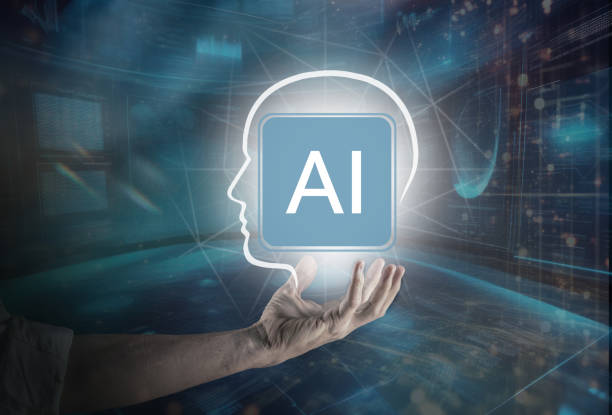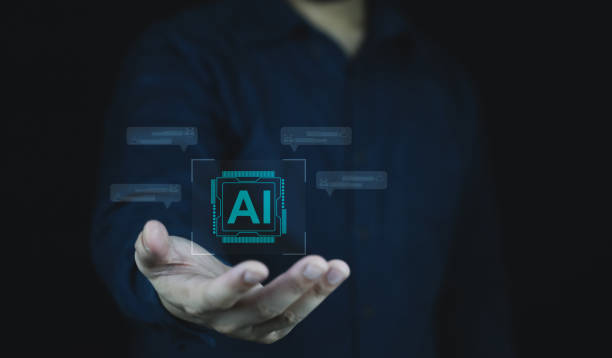What is an AI Assistant and How Does it Work?
An #AI_Assistant is a software or computer system designed to help users perform various tasks.
These tasks can include answering questions, providing information, performing calculations, writing text, translating languages, and even controlling other devices.
AI assistants are built based on #Artificial_Intelligence (AI) techniques such as Natural Language Processing (NLP), Machine Learning (ML), and Deep Neural Networks (DNN).
These techniques enable them to understand human language, learn from data, and make intelligent decisions.
Generally, an AI assistant works as follows: the user provides a request to the assistant in text or voice.
The assistant uses NLP to analyze the request and understand the user’s intent.
Then, the assistant uses its knowledge and information to respond to the user’s request.
This response can be in the form of text, audio, image, or even an action.
AI assistants are constantly learning and improving.
The more they are used, the better they perform.
Some well-known examples of AI assistants include Siri (Apple), Google Assistant (Google), Alexa (Amazon), and Cortana (Microsoft).
These assistants are available on various devices such as smartphones, smart speakers, computers, and cars.
Are you tired of losing business opportunities because you don’t have a professional company website?
Rasaweb helps you by designing a professional company website:
✅ Build a powerful and reliable image of your brand
✅ Turn website visitors into loyal customers
⚡ Get a free consultation right now!
Advantages and Disadvantages of Using AI Assistants
Using an #AI_Assistant has many advantages.
These assistants can help users perform various tasks, save their time and effort, and provide them with the information they need quickly and easily.
AI assistants can also help people with disabilities to achieve tasks they were previously unable to do.
Click here to preview your posts with PRO themes ››
However, using an #AI_Assistant also has disadvantages.
These assistants may not always be accurate and reliable, and they sometimes provide incorrect or misleading information.
There are also concerns about the privacy and security of user information, as AI assistants often have access to users’ personal information.
Over-reliance on these assistants can also lead to a decrease in cognitive and problem-solving skills in humans.
In addition, ethical issues related to the use of #AI_Assistants in sensitive areas such as medicine and law should also be considered.
Ultimately, the decision to use an #AI_Assistant should be made by considering its advantages and disadvantages and based on individual needs and circumstances.
Various Applications of AI Assistants in Everyday Life
#AI_Assistants have widespread applications in our daily lives.
They can help us with various tasks, provide the information we need, and even entertain us.
Some common applications of #AI_Assistants include:
Task Management: Setting reminders, creating to-do lists, scheduling meetings, and managing calendars.
Providing Information: Answering questions, searching for information on the internet, providing news and weather reports.
Communications: Sending text messages, making phone calls, sending emails, and managing social networks.
Entertainment: Playing music, podcasts, and audiobooks, playing games, and providing movie and TV series recommendations.
Device Control: Controlling smart home appliances, adjusting lights and temperature, and opening and closing doors.
Education: Providing online tutorials, answering school questions, and helping to learn foreign languages.
In addition, #AI_Assistants are used in various fields such as medicine, law, marketing, and sales.
For example, in medicine, #AI_Assistants can help diagnose diseases, provide treatment plans, and monitor patients’ conditions.
In general, the applications of #AI_Assistants are very broad and diverse, and with the advancement of technology, these applications are increasing day by day.
| Application | Description |
|---|---|
| Task Management | Setting reminders, creating to-do lists |
| Providing Information | Answering questions, searching for information |
| Communications | Sending text messages, making calls |
Choosing the Best AI Assistant for You
Choosing the best #AI_Assistant depends on your personal needs and preferences.
Some important factors to consider include: compatibility with the devices and operating systems you use, the capabilities you need, accuracy and reliability, privacy and data security, and price.
If you use Apple products, Siri may be the best option for you.
If you are looking for a powerful AI assistant with extensive capabilities, Google Assistant may be a good option.
Alexa is very suitable for controlling smart home appliances.
Cortana can also be a good option for Windows users.
In addition, you should keep in mind that #AI_Assistants are constantly being developed and improved.
Therefore, you may need to try different assistants periodically to see which one works best for you.
Also, the opinions and experiences of other users can help you choose the best #AI_Assistant.
Did you know that 94% of users’ first impressions of a business are related to its website design? With professional company website design by **Rasaweb**, turn this first impression into an opportunity for growth.
✅ Attract more customers and increase sales
✅ Create credibility and trust in the eyes of the audience⚡ Get a free website design consultation!
What Will the Future of AI Assistants Be?
The future of #AI_Assistants looks very bright and promising.
With the advancement of technology, these assistants are becoming smarter, more powerful, and more practical day by day.
In the future, we can expect #AI_Assistants to play a much more important role in our daily lives and help us perform various tasks more effectively and efficiently.
Some of the key trends we will see in the future of #AI_Assistants include: increased accuracy and reliability, improved natural language understanding, greater integration with other devices and services, greater personalization, and the development of new capabilities such as emotion recognition and needs prediction.
Also, we can expect #AI_Assistants to find applications in new fields such as education, healthcare, and transportation.
However, the development of #AI_Assistants also comes with challenges.
Issues related to privacy and data security, ethical issues, and concerns about job losses should be considered.
However, by properly managing these challenges, we can benefit from the countless advantages of #AI_Assistants.
How to Use AI Assistants Safely?
Using #AI_Assistants safely requires observing specific tips and precautions.
Since these assistants have access to your personal information, maintaining privacy and data security is very important.
Some of the things you should keep in mind include:
Using Strong Passwords: Use strong and unique passwords for your user accounts.
Enabling Two-Factor Authentication: Enable two-factor authentication for your accounts for greater security.
Checking Access Permissions: Check the access permissions of the #AI_Assistant and only enable the permissions that are necessary.
Be Careful About the Information You Share: Avoid sharing sensitive and personal information with your #AI_Assistant.
Updating Software: Update the #AI_Assistant software and your device’s operating system regularly.
Using Reliable Sources: Use #AI_Assistants from reliable sources and avoid downloading and installing suspicious programs.
Awareness of Phishing Risks: Be careful of phishing emails and messages and do not provide your personal information to unknown people.
By following these tips, you can use #AI_Assistants safely and securely and benefit from their advantages.
Comparison of Popular AI Assistants: Siri, Google Assistant, Alexa, and Cortana
Currently, Siri (Apple), Google Assistant (Google), Alexa (Amazon), and Cortana (Microsoft) are among the most popular #AI_Assistants on the market.
Each of these assistants has its own unique features, advantages, and disadvantages.
Here we compare these assistants:
Siri: Siri is compatible with Apple devices such as iPhone, iPad, and Mac.
This assistant is notable for its simple user interface and integration with the Apple ecosystem.
Siri performs well in simple tasks such as setting reminders, sending text messages, and playing music, but it may be slightly weaker than other assistants in understanding natural language and answering complex questions.
Google Assistant: Google Assistant is a powerful AI assistant with extensive capabilities.
This assistant is compatible with Android and iOS devices and can help users in various fields such as searching for information, managing tasks, controlling smart home appliances, and providing personalized recommendations.
Google Assistant performs very well in answering complex questions due to its strong natural language understanding and access to Google’s vast database.
Alexa: Alexa is specifically designed to control smart home appliances.
This assistant is compatible with various devices such as smart speakers, televisions, and home appliances and can help users control lights, temperature, play music, and perform other tasks.
Alexa is very popular among smart home appliance users due to its strong voice control capabilities and integration with the Amazon ecosystem.
| AI Assistant | Compatibility | Strengths | Weaknesses |
|---|---|---|---|
| Siri | Apple Devices | Simple User Interface, Integration with Apple Ecosystem | Weaker Natural Language Understanding |
| Google Assistant | Android and iOS | Strong Natural Language Understanding, Access to Google Database | Privacy Concerns |
| Alexa | Smart Home Appliances | Strong Voice Control, Integration with Amazon Ecosystem | Limitations in Non-Home Capabilities |
Impact of AI Assistants on Jobs and the Economy
#AI_Assistants have a significant impact on jobs and the economy.
On the one hand, these assistants can increase productivity and reduce costs in many industries.
For example, #AI_Assistants can automate repetitive and time-consuming tasks, provide employees with the information they need quickly and easily, and help improve decision-making.
On the other hand, there are concerns about job losses due to the replacement of human labor with #AI_Assistants.
However, many experts believe that #AI_Assistants act more as a complement to the human workforce than a replacement for it.
In fact, #AI_Assistants can help employees focus on more complex and creative tasks and create more value for their organization.
In addition, the development and maintenance of #AI_Assistants itself creates new jobs in various fields such as software development, data science, and artificial intelligence.
In general, the impact of #AI_Assistants on jobs and the economy is complex and multifaceted.
By properly managing these impacts, we can benefit from the countless advantages of #AI_Assistants and prevent their negative effects.
Does your current company website not reflect the credibility and power of your brand as it should? Rasaweb solves this challenge for you with professional company website design.
✅ Increase Credibility and Trust of Visitors
✅ Attract More Targeted Customers
⚡ Click to Get a Free Consultation!
Ethical Challenges of Using AI Assistants
The use of #AI_Assistants is associated with several ethical challenges.
One of the most important of these challenges is maintaining the privacy and security of user information.
#AI_Assistants have access to users’ personal information, and it must be ensured that this information is stored securely and not misused.
Another ethical challenge is discrimination and bias.
#AI_Assistants are trained based on data that may contain unconscious biases and discriminations.
These biases can lead to unfair and discriminatory decisions by #AI_Assistants.
Therefore, it must be ensured that the training data of #AI_Assistants is free of biases and that #AI_Assistants act fairly and without discrimination.
In addition, accountability and responsibility are also important ethical challenges in the use of #AI_Assistants.
If an #AI_Assistant makes a wrong decision or causes damage, who will be responsible? There should be mechanisms for determining responsibility and accountability for the actions of #AI_Assistants.
Finally, transparency and understandability are also important ethical challenges.
Users should be able to understand how #AI_Assistants work and the reasons for their decisions.
This helps to increase users’ trust in #AI_Assistants and their responsible use.
Key Tips for AI Assistant Developers
Developing #AI_Assistants requires specific knowledge and skills.
Developers should be familiar with artificial intelligence techniques such as natural language processing, machine learning, and deep neural networks.
In addition, they should pay attention to issues related to privacy, security, and ethics.
Some key tips for #AI_Assistant developers include: Defining a Clear Goal: Before you start developing, define your goal for building the #AI_Assistant.
What problem do you want to solve? What need do you want to address? Choosing Appropriate Data: The training data for the #AI_Assistant should be high-quality, diverse, and free of biases.
Using Appropriate Algorithms: Choose AI algorithms based on your needs.
Continuous Testing and Evaluation: Continuously test and evaluate the #AI_Assistant and improve its performance.
Paying Attention to Privacy and Security: Prioritize the privacy and security of users’ information.
Transparency and Understandability: Design the #AI_Assistant in such a way that users can understand how it works and the reasons for its decisions.
By following these tips, you can develop a high-quality #AI_Assistant that helps users perform various tasks and improves their lives.
#AI assistants are constantly looking to improve their performance.
Frequently Asked Questions
| Number | Question | Answer |
|---|---|---|
| 1 | What is an AI assistant? | An AI assistant is a software application that uses artificial intelligence to help users perform various tasks, provide information, or automate processes. |
| 2 | What are some examples of AI assistants? | Famous examples include Siri, Google Assistant, Alexa, and Cortana. |
| 3 | How does an AI assistant work? | AI assistants typically use natural language processing (NLP) to understand user voice or text commands and machine learning to improve their performance. |
| 4 | What are its capabilities? | Capabilities such as answering questions, setting reminders, playing music, sending messages, controlling smart devices, and providing weather information. |
| 5 | How is data security in AI assistants? | Data security is an important concern. Companies try to protect users’ data using encryption and privacy policies, but users should always be aware of potential risks. |
| 6 | Can AI assistants understand emotions? | Currently, AI assistants cannot understand real emotions, but they can recognize tone and words associated with emotions and provide appropriate responses. |
| 7 | What are the applications of AI assistants in the workplace? | In the workplace, they can be used to schedule meetings, manage emails, search for information, and even help write draft documents. |
| 8 | What will the future of AI assistants be like? | In the future, they are expected to be smarter, more personalized, and have more capabilities, so that they can proactively predict users’ needs and even help in complex decision-making. |
| 9 | What is the difference between an AI assistant and a chatbot? | An AI assistant typically has a wider range of capabilities and interactions (often voice), while chatbots typically focus on specific tasks in a text-based context. |
| 10 | How can you make the best use of an AI assistant? | For optimal use, you should familiarize yourself with its voice commands and capabilities, sync it with other devices, and allow it to learn your usage through interactions. |
And other services of Rasa Web Advertising Agency in the field of advertising
Smart Marketplace: Designed for businesses looking to grow online through intelligent data analysis.
Smart SEO: A new service to increase website traffic through a SEO-driven content strategy.
Smart Brand Identity: A creative platform to improve website traffic by managing Google Ads.
Smart Digital Advertising: A creative platform to improve click-through rates with precise audience targeting.
Smart Marketplace: Professional optimization for digital branding using real data.
And over hundreds of other services in the field of internet advertising, advertising consulting and organizational solutions
Internet Advertising | Advertising Strategy | Advertorial
Sources
Virtual Assistant Definition in Gartner
,What is Artificial Intelligence? – IBM
,Wired’s Guide to Artificial Intelligence
,Artificial Intelligence Definition – TechTarget
? Are you ready to transform your business in the digital world? Rasaweb Afarin, a leading digital marketing agency, paves the way for your growth by providing comprehensive services including exclusive website design, SEO, and advertising campaign management.
📍 Tehran, Mirdamad Street, next to the Central Bank, South Kazerun Alley, Ramin Alley No. 6













